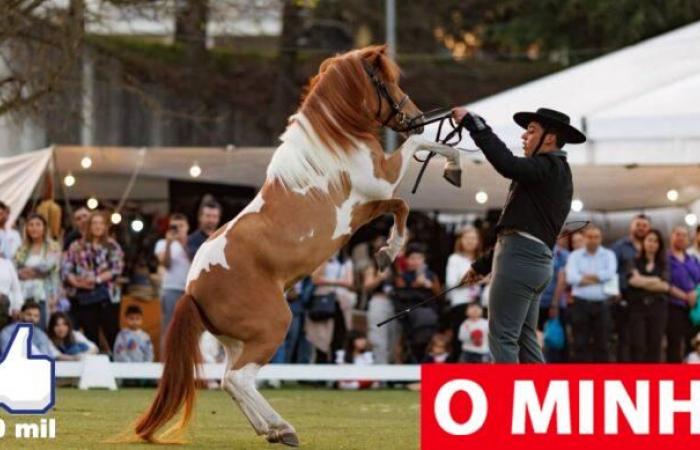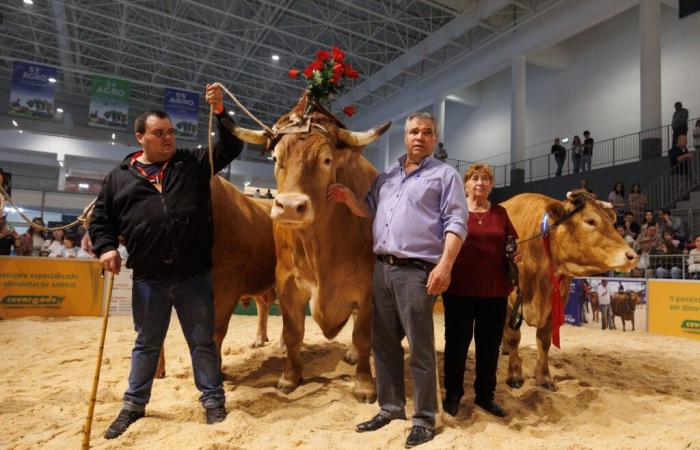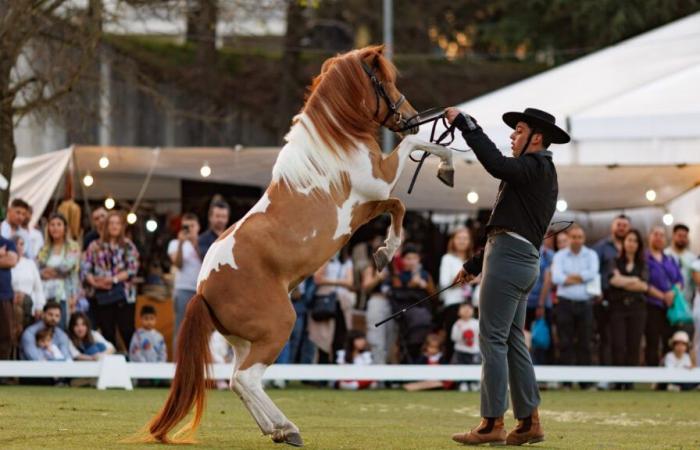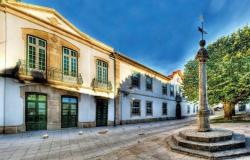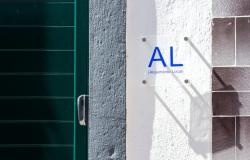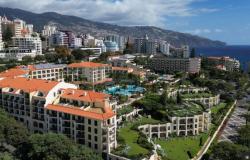The presence of families was the hallmark of the third day of AGRO. This Saturday’s activities in summer temperatures included horse riding, innovative livestock competitions, many tastings of Minho delicacies, transmission of knowledge in seminars and loud drumming.
This Saturday, March 23rd, thousands of people visited AGRO. Joy permeated every space at Altice Forum Braga, from the conferences to the 500 animal tents. Like the previous day, the fair promoted the show “Lusitanian Horses – Sound, Light and Fado. This great news brought hundreds of people to the arena to watch the immersive spectacle of music, dance and fire-breathing. The equestrian artists displayed their agility, performing dazzling maneuvers.
In the same area, AGRO KIDS had a program entirely dedicated to families, such as scent bags, sowing and hanging garden workshops, promoted by Quinta Pedagógica de Braga.
The exhibition of Agricultural Tools, from the beginning of the century, located on the first floor of the pavilion, is an unmissable opportunity to revisit the instruments of the past with nostalgia. The small thresher, the corn and bean harvester made of wood and the manual seeders are examples of the technologies of the past on display.
To create various pieces of wood art, sculptor Emanuel uses chainsaws of different sizes to carefully excavate them. The artist uses remains from forest cleaning to draw icons such as lions, horses, eagles and other figures.
Also about art, AGRO’s photographic exhibition has as its theme the celebration of InvestBraga’s tenth anniversary, highlighting the history of the Fair, which is older than the organization itself. The last 60 years have several records, and José Olímpio, operational director of Fairs, Congresses and Events, adds a curiosity: “The mural contains references to the first agricultural fair in Braga, with the awarding of agricultural prizes – A minutes from King D. Louis I of 1863”.
Carlos Silva, executive administrator of InvestBraga, believes that AGRO is an unparalleled event in the country – “Of the fairs that exist in Portugal, there are few with a matrix essentially linked to agriculture”.
This Saturday’s livestock competitions included the Minhota Breed, promoted by the Portuguese Association of Minhota Breed Cattle Breeders (APACRA) and the 12th National Cachena Breed Competition, promoted by the Barrosã Breed Cattle Breeders Association (AMIBA). For the first time, trainers and handlers of the Friesian Holstein breed took to the ring to show their skills in preparing the best specimens. José Olímpio added “In previous years, it was inside the stable that the trainers lined up the animals using shearing, hair drying and other techniques, so that they could be paraded the next day. This year, this task leaves the cowshed and moves to the stage.”
The typical taverns and DOP meat restaurants are another big reason that brought the public to AGRO. Traditional delicacies, from convent sweets to smoked meats and cheeses, keep alive the soul of a Portugal that serves well.
The gastronomic activities did not end there. During this Saturday, nine cooking shows showcased the best that is done in Minho. Fidalguinhos, paired with wines from Quinta da Pegadinha and Quinta das Pereirinhas, Cabbages with Beans and Cornbread, paired with Floral de Monção wine, Bacalhau à Braga, with chef José Dias, paired with CAVAGRI wines, Roasted Galo à la Barcelos, Pica no Chão with chef Leonel Martins, paired with Alvaminho wines, were some of the initiatives that took place on the AGRO stage. These actions were supported by Mercado Abastecedor de Braga (MARB). Carlos Silva highlights the importance of AGRO as a living representation of national heritage: “We have the entire country here”, he declares, highlighting the fair’s ability to encompass Portugal’s rich agricultural and livestock diversity.
AGRO is also a space for sharing knowledge. This Friday morning, DEFIL promoted the seminar “Innovation in Agriculture: Opportunity or Necessity?”. With climate change posing significant challenges, such as worsening drought, increasing soil erosion and decreasing biodiversity, innovative solutions have been addressed to combat these adverse effects. Among the techniques discussed, micropropagation emerges as a promising strategy for preserving species and renewing plantations, allowing replication in the laboratory from a part of the mother plant. This approach not only guarantees the biodiversity of indigenous species but also enhances productivity.
Another highlighted theme was the role of mycorrhizae, a symbiotic relationship between plant roots and fungi, which expands the ability of plants to absorb water and nutrients, reducing the need for chemical fertilizers and providing farmers with an additional source of income through cultivation. of mushrooms.
The subsequent round table, “Competitiveness vs Sustainability: the great challenges of the agricultural sector”, reinforced the message that innovation is fundamental for sustainability and competitiveness in the sector, together with several experts, including Fernanda Fidalgo (Faculty of Sciences from the University of Porto/GreenUPorto), Pedro Brás de Oliveira (INIAV, IP), Susana Araújo (More – Colab Montanhas de Investigação) and Tadeu Alves (GreenFactor). Tadeu Alves highlighted the importance of equipping producers with tools that allow them to respond to market demands, including social responsibility practices, certification and climate sustainability. “No one wants productive soil and favorable weather conditions more than the producer. We are one of the main carbon fixers in the soil,” he said.
Pedro Oliveira and Susana Araújo shared the vision that innovation transcends academic opportunity, revealing an urgent need given the increase in population and the limitation of arable land. Innovation thus emerges as an indispensable tool to guarantee food security in a context of environmental and financial challenges.
The seminar highlighted the complexity of decoupling opportunities from the need for innovation, highlighting the importance of innovative approaches, both in the laboratory and in the field, to face contemporary challenges in agriculture.
This event also discussed the topics “Syntropic Agriculture – A possible path to a more abundant future”, promoted by the Dispersor Project/Okatsune Ibérica and workshops on “Fruit Tree Grafting”, taught by Raúl Rodrigues, from Cisas, Escola Superior Agrária from IPVC, and “How to Make a Hanging Garden”, promoted by Quinta Pedagógica de Braga and Leroy Merlin.
With more than 25,000 m², of which 15,000 m² dedicated to exhibitors, AGRO has the strong support of its partners, notably the official sponsor, the Campicarn group, a national company in the meat sector.
In a recent conversation with Rádio Antena Minho, broadcast live from the event, Manuel Martins, founder and chairman of the board of directors of Grupo Campicarn, shared the humble and dedicated origins of the brand. “I was born into cattle and since I was little I helped my father”, he revealed, highlighting the long trajectory that led the company to become a renowned brand both nationally and internationally.
Campicarn’s success, according to the president, is due to meticulous attention to market trends and needs. “The consumer is the boss,” he said. This approach has resulted in strong business relationships with several European countries, including Germany, the Netherlands, France, Denmark, Italy, England, Spain and Ireland.
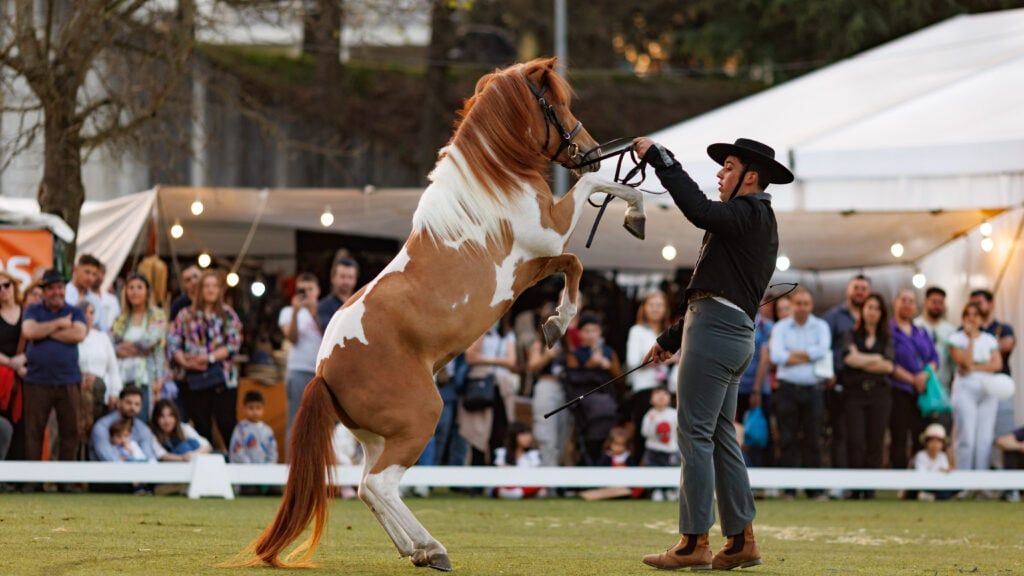
In addition to expansion and commercial success, the Campicarn Group has stood out for its commitment to sustainability and quality. A large part of its production is its own, which allows the company to strictly control the quality of the products that reach the consumer. “We are committed to ensuring that our products are permanently sustainable, safe and of quality”, reiterated Martins, echoing the message conveyed in the two seminars promoted at AGRO on animal production and healthy eating.
Membership in AGRO is, for the group, a valuable opportunity to strengthen ties with the agricultural sector and to reaffirm its commitment to the values of sustainable agriculture and livestock farming. “Our daily lives involve interacting with the exhibitors who are here, mainly from agriculture”, concluded Manuel Martins.
Another year, AGRO encourages sustainable travel to the venue. In partnership with TUB, all visitors will be able to take the special shuttle on Sunday afternoon, which will depart from Minho Center and E.leclerc. The ticket costs €1, round trip, and whoever presents it at the Altice Forum Braga box office will have a 50% discount on entry to the event. Leaving cars parked in these spaces contributes to smoother traffic and fewer carbon emissions. The organization warns of parking constraints in the vicinity of Altice Forum Braga, which will be mostly occupied by fair employees.
The last day of the event is expected to be full, with activities for the little ones at Quinta Pedagógica de Braga with an insect hotel workshop and a super-animal medallion activity. The showcookings will continue to delight visitors, on a journey through the flavor and tradition of Douro olive oil, by exhibitor Pipa de Sabores, who will also guide the traditional folkar limiano and smoked meats of Ponte de Lima. The Esperança Verde restaurant will also prepare Minho loin, fungi and roots, on a menu paired with CAVAGRI wines. The day will also feature livestock competitions, with the 35th national livestock competition for the Barrosã breed and the livestock competition for the Holstein Frísia breed.
The afternoon will be full of entertainment with the performance of the Folklore Group of Rusga de Merelim de S.Paio de Braga, the Folklore Group of the University of Minho (GFUM) and the Fado Group of ARCUM. The end of the afternoon will be the responsibility of the Municipality of Póvoa de Varzim, which brings Horpozim – Horticultural Business Association to prepare the Póvoa soup. The municipality of Barcelos, with Restaurante Chuva, will also produce sarrabulho porridge in the Barcelos style, setting the tone for the closing of the 56th edition of AGRO, which closes its doors at 8 pm.
To all visitors, AGRO appeals to contribute to this year’s solidarity cause – “Agro LOVES Ukraine”. AMA is the acronym that stands for Non-perishable Foods, Medicines and Heating (warm clothing or small heaters). The Luso Ukrainian Association is present at the entrance to the fair, which will collect all donations. Torrestir, a transport company, offered its services and will transport the goods to Ukraine.
Tags: Lusitanian horses attract hundreds AGRO
--
